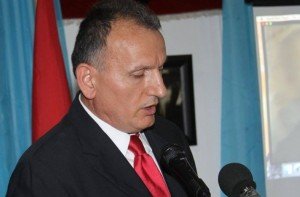I have the highest regard for former Congressman Joe Dioguardi’s work in defense of Kosova. As a member of Congress and as head of the Albanian American Civic League, Mr. DioGuardi spoke loud and clear in support of the ethnic Albanians of Kosova, and warned the international community long before the breakup of Yugoslavia that the Serbian aggression, headed by Slobodan Milosevic, must be stopped.
Yesterday, I read a letter that Mr. DioGuardi recently wrote to the Mayor of Tepelena, a town in the southern part of Albania, where the communist regime established a concentration camp after WWII. The letter dated July 12, 2018 was published in “Gazeta Dita” I strongly disagree with Mr. DioGuardi’s statement to Mayor Peçi of Tepelena, urging him to not support the establishment of a memorial complex in honor of the victims of communism.
After WWII, thousands of women and children from influential Albanian families were rounded up in military fashion and forced into concentration camps that reeked of human suffering and death. In these barbed wire camps, survivors have reported that in one night 34 infants suffered and died due to inhumane conditions. The only crime that the detainees committed was that they were the children, the fathers, and the grandfathers of people who expressed different political views. These victims were sent to this camp, just like many other camps in Albania, to suffer and their suffering continued for nearly five decades, until the fall of communism.
Among my family members in the Tepelena Camp, I count my mother, Sanije, my aunts Feride, Fatime, and Shpresa, my grandmother, Gjulije, and my uncle, Ahmet Kolgjini. In addition, my uncle Qemal Gashi’s wife, Lirije (daughter of Muharrem Bajraktari) with her brother and mother were transferred from Berat to the Tepelena Camp. Lirije’s mother died in the Tepelena Concentration Camp. Lirije never found the remains of her mother.
In 1944, the Fifth Brigade of the communist army, headed by General Shefqet Peçi, marched into Luma, a district in northern Albania, executing people and causing terror. They burned my grandfather’s home and confiscated his property. In 1945, armed military and police forces rounded my grandfather’s family and deported them to a concentration camp in Berat. My grandfather, Haziz Gashi, had vigorously opposed the communist ideology. For his anti communist stand, he was sentenced to death in absentia as soon as the communist authorities took over the Albania. Among my family members detained in Berat, I count my father, Haxhi Gashi (11); my uncles, Ramiz (10) and Gani (23, with wife and infant son); my aunts Dalije (4), Remzije (1); my grandmother Zarije Gashi, and my cousins Gafurr Spahija and Kadishe Spahija. Two of my infant cousins, Lutfi (son of uncle Gani and Kadishe, infant daughter of Prof. Miftar Spahija died in the Berat Camp).
Holocaust museums and memorials have been established all over the world from Argentina to Uruguay. There are hundreds of such memorials and museums in the United States. Their purpose is to honor the victims and to educate the public of the atrocities committed against humanity.
All internment camps and political prisons in Albania should be turned into museums. Memorials to honor the victims of communism should be erected in every city and those who have committed crimes, Hoxha’s willing executioners, should be brought to justice.
Unfortunately, we cannot erase the past but we are morally obligated to provide justice to the victims through recognition of their suffering. This horrific part of Albanian history should be exposed (and integrated into school curricula) so that Albania’s youth and future generations can also say, WE WILL NEVER FORGET.
*-Mithat Gashi escaped from Albania in 1986. He is a board member of the Holocaust, Genocide, Interfaith Education Center at Manhattan College.
